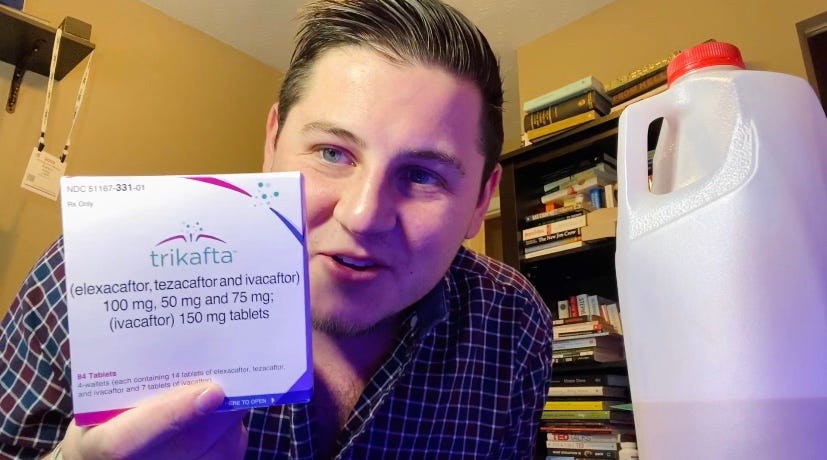A quick preface: Since beginning this newsletter or whatever it is a month ago, I have gained more than fifty subscribers bringing the total up to almost 190 readers! I’m so thankful for everybody taking the time to read my words. It truly means a lot to me. This newsletter is giving me a chance to have better conversations and write more personal writings which is also very exciting. Please do let me know if you’ve shared my newsletter or any of my pieces with anybody or if you have any commentary you’d like to add. I’m always interested. Sharing my pieces and newsletter with more eyes is one of the best and easiest ways to support my writing. Thanks again, and enjoy the piece!

It’s been a month and a few days since I began the drug everybody in the CF community is talking—for better or for worse—about: Trikafta. I had my clinic appointment a few days ago and the results are good: My lung function is up about 3-5% (it’s hard to say exactly for a number of reasons). This is certainly good; my lung function is higher than it has been in nearly two years to a point where I feel very happy with it as a baseline. Others were seeing boosts of 10-15%, even 20-25% in some cases, but I’m not disheartened. Lung function is not a definitive biomarker and there are plenty of drawbacks to strictly using it to gauge how somebody is feeling.
Ultimately, I feel better. I feel amazing, actually. My lungs feel stronger than ever, my cough is almost nonexistent, my breaths deeper, my energy higher, my mucus thinner, and my muscles less sore. I expected to feel better, but the effects have been pretty remarkable. I didn’t think that I’d wake up after lying sedentary for eight hours with clear lungs, even before doing a treatment. I didn’t expect to work out and inhale deeply with no crackling or wheezing. It’s hard to put into words how different I feel, despite my numbers not changing much.
And in addition to all those positive effects, I’m in a good mental space. It’s probably the best mental space I’ve been in since Alyssa died a year and a half ago. In a lot of ways, life hasn’t changed much since my sister died. I still live in the same general area, my health is about the same (well, maybe not now with Trikafta, we’ll see), my parents are in the same town, I’m in the same job.
But, really, life and the world have changed dramatically in other ways. Alyssa died before the robust effects of Trikafta were released in the early clinical trials. It’s been almost two years since she died. How the hell is that possible?! It hurts to think it’s been that long already. Two years. You know every milestone is going to come and yet they still feel so weird when they arrive. We’re going to celebrate our second Christmas without her. She would be 31. I’m in my mid-twenties!
As I grow older, I learn valuable lessons about time, life, and our relationships with others. I feel bitter that I didn’t get more time with my sister or that my parents had to lose a child. But I’m also so grateful I had a sister and that I’ve even existed in this realm of the universe. Bittersweet is an emotion I know so well. I used to wonder why our golden years had to be when we were kids, but it turns out our golden years are our entire lives; it’s just that the golden glow is the nostalgic sheen of dusk on our days before the ones we’re currently living in.
That isn’t to say that there aren’t dark times. There are, of course. The days after Alyssa’s death were hazy, gloomy, and disjointed. There were beautiful moments, too. I can recall the amazing stories people shared about my sister in the days after. Literally hundreds of people texted or messaged me on social media. Some told me of the many ways my sister inspired them, especially her fashion. Others told me how Alyssa had been there for them in their times of need or her constant checking in to make sure they were feeling well. As empty as I felt when my sister died, I was shrouded in a comfort by more people than I can count, offering support; people offered to make us food, bring us wine or bourbon, to walk our dogs, they sent us flowers, they prepared meals without us asking, they donated to causes that were important to my sister. In the midst of the hardest week of my life, the beauty and light of the world showed itself to me and my parents when we dearly needed it.
It’s hard to overstate just how strange existence is. The last days of my sister’s life were, strangely enough, kind of just boring? What a bizarre sentence to type. What I remember about those days was how they brought life into focus, narrowing the lens of life from the macro to the micro. I’m not sure I’ve ever written too much about what her final days looked like or what even happened.
The basic explanation is that my sister was in chronic rejection, otherwise known by the gruesome sounding bronchiolitis obliterans syndrome. The mechanism is complicated and poorly-understood. By the end, my sister’s lungs simply failed. They continued weakening due to accrued damage until they eventually couldn’t metabolize oxygen any longer. She was awake and joking around (and yelling at me about how I didn’t get her fries right) on March 3rd when we had family in town, then on Sunday the 4th after everybody left aside from my parents, she took a nap. She was never fully conscious again until she died on the 12th.
On the 4th, I took my cousin to the airport. I occupied a weird role in all of this. I knew what the future held. All intervention had failed. Alyssa was going to die. The question was how long could she survive with failing lungs. The harder question was how long could she feel okay without painkillers as her lungs continued breaking down. So, I had to explain that to family and friends, and I had to elaborate to them that we must hope for peace for my sister. It’s a cruel feeling, to explain to people how your sister is dying but you don’t quite know how to put it so you use weird concessional language like “It’s only a matter of time” "or “Things don’t look good right now.” We tiptoe around the cruel reality for reasons unknown or at least not obvious. Who or what are we trying to preserve? Are we preserving the status quo of shying around conversations about death? Are we being gentle because it’s tragic to speak of a loved one dying? Are we lying to ourselves? Was I protecting others from the strangeness of how to console a friend as their sister and best friend is dying?
Alyssa needed to rest on March 4th. It had been a long weekend of family visiting—saying what would end up being their final goodbyes—and she was exhausted. That evening, I woke up to a call from my parents in the middle of the night telling me to come down first thing in the morning. I was lucky that my job was understanding; others aren’t able to take time off like that. But Alyssa, true to her final moments, was resilient. We would spend dozens of hours patiently waiting by her side, offering her bits and pieces of our love and appreciation for her. I needed her to know that I was going to take care of my parents, that we would be okay, that she needed to rest her tired body, that she had given it her all, and that she had by no means failed by allowing herself to die. We watched as her chest took shallow, rapid breaths. Her heart rate was high all the time. It was boring and it was torture. The truth was: the next best day of my sister’s life was going to be the day she died. We hoped that would come as peacefully and painlessly as possible. What a horrible, weird hope.
Then on the 12th, her breathing changed. We surrounded her side as a family for the final time as we waited, begging her to let go. And that was it. As quickly as we fall asleep every night, her heart stopped forever. She was gone.
We sat with her for a bit. The nurses came and told us to take the time we needed. After a time, we walked out of her hospital room with her belongings. We walked at a normal pace, but faster than Alyssa could handle when she was short of breath. We didn’t need to get a wheelchair or to deal with any discharge paperwork. We got to our cars and we drove home, just like we did every other time Alyssa had left the hospital. This time, we were short one person and infinite memories. It was ruthless, but it was simple. It was boring, yet tragic.
The world without my sister has been dimmer. Trikafta has brightened it up a notch or two. It has given me optimism that I will live a long life. I wish my sister could have seen that, but today, I don’t feel like I spend as much time preoccupied with the what-ifs or what-could-have-beens. I feel more at peace, more cognizant of the beauty of existence, of how boring and beautiful it all is. Every waking moment is a tiny fragment of the existence of time, and every waking moment is a miracle that anything exists at all.
My sister wanted me to be happy and healthy. I’ve wondered every day since even before her death how I could be happy without her here. How could I ever convince my brain that life was okay? I’m learning that it’s not so much that life is okay. It doesn’t have to be okay or good to recognize the beauty of it all. Even in the darkest moments, we can find beauty and hope. In every tragic time, there will be memories that shine with the golden hue of nostalgia. And even in the worst of times, people will help and they will be there. The key is being one of those people we need when others are going through those worst of times.
Asking for people to share or subscribe is painful self-promotion, but it’s something I have to do, so please don’t forget to subscribe if you haven’t and to share if this made you feel anything at all. I also want people to reply to the email and give me their thoughts and experiences that come to my mind when you read my writing, whatever it may be. Thanks, as always.

TL



